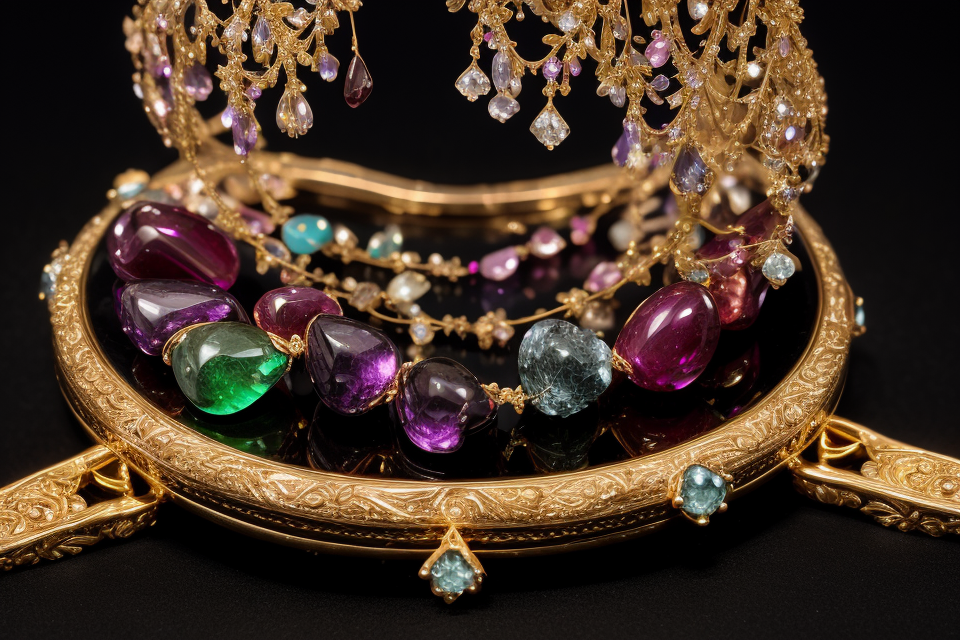Unveiling the Value of Jewelry: A Comprehensive Guide to Determining Worth
Related Articles: Unveiling the Value of Jewelry: A Comprehensive Guide to Determining Worth
Introduction
With enthusiasm, let’s navigate through the intriguing topic related to Unveiling the Value of Jewelry: A Comprehensive Guide to Determining Worth. Let’s weave interesting information and offer fresh perspectives to the readers.
Table of Content
Unveiling the Value of Jewelry: A Comprehensive Guide to Determining Worth
:max_bytes(150000):strip_icc()/how-to-tell-if-your-jewelry-is-valuable-in-three-steps-2043563-v3-HL-FINAL-5bfc1b2c46e0fb005178d37b.png)
Jewelry, a timeless expression of beauty and sentiment, often holds significant monetary value. Whether inherited, gifted, or purchased, understanding the worth of your jewelry pieces can be crucial for various reasons. It informs decisions about insurance, sale, or even simply appreciating the heritage and financial significance of your collection. This guide provides a comprehensive overview of how to determine the worth of jewelry, offering insights into the factors that influence value and the methods for accurate appraisal.
Understanding the Factors that Determine Jewelry Value
Several key factors contribute to the intrinsic value of jewelry. Recognizing these elements is crucial for understanding the worth of your pieces:
- Material: The type of metal used is paramount. Precious metals like gold, silver, platinum, and palladium are valued based on their purity and market price. The karat or fineness of the metal (e.g., 14K gold, 925 sterling silver) directly impacts value.
-
Gemstones: The presence and quality of gemstones significantly influence the worth. Gemstones are evaluated based on the "Four Cs":
- Carat: The weight of the gemstone, measured in carats.
- Cut: The way the gemstone is shaped and polished, affecting its brilliance and sparkle.
- Clarity: The presence of inclusions (internal flaws) and blemishes (external imperfections).
- Color: The intensity, tone, and saturation of the gemstone’s hue.
- Design and Craftsmanship: The artistry and intricacy of the design play a role in value. Unique or intricate designs, handcrafted pieces, or those with historical significance often command higher prices.
- Brand and Maker: Reputable brands and renowned jewelry makers often add to the value of a piece.
- Condition: The overall condition of the jewelry, including wear and tear, scratches, or damage, can significantly impact its worth.
- Market Demand: The current popularity and demand for a specific style, metal, or gemstone can fluctuate the value.
- Historical Significance: Jewelry with a historical connection or provenance, such as a family heirloom, can hold significant sentimental and monetary value.
Methods for Determining Jewelry Worth
Several methods can be employed to determine the value of your jewelry:
1. Online Resources and Tools:
- Jewelry Price Guides: Websites like Blue Nile, Gemvara, and Gem Rock Auctions provide price guides and market data for various gemstones and metals.
- Online Appraisers: Platforms like Worthy and Estate Diamond Jewelry offer online appraisals, allowing you to upload images and receive an estimated value.
- Comparison Shopping: Research similar jewelry pieces sold online or at reputable retailers to get an idea of market pricing.
2. Consulting a Professional Appraiser:
- Certified Gemologist Appraiser (CGA): A CGA is a certified professional who specializes in evaluating gemstones and jewelry. They possess extensive knowledge of materials, design, and market trends.
- Gemological Institute of America (GIA): The GIA offers appraisal services, including lab reports for gemstones, providing a reliable and internationally recognized assessment.
- American Society of Appraisers (ASA): The ASA offers a network of qualified appraisers specializing in various fields, including jewelry.
3. Auction Houses:
- Sotheby’s, Christie’s, and Bonhams: These prestigious auction houses offer appraisal services and provide an assessment of the market value of your jewelry.
Tips for Getting an Accurate Appraisal:
- Choose a Reputable Appraiser: Verify the appraiser’s credentials and experience. Look for certifications from recognized organizations like the CGA, GIA, or ASA.
- Provide Comprehensive Information: Gather all relevant details about your jewelry, including the maker, materials, gemstones, and any known history or provenance.
- Get Multiple Appraisals: Seeking evaluations from multiple appraisers can provide a range of opinions and help you determine a fair market value.
- Ask for a Written Report: Ensure the appraisal is documented in a written report outlining the details of the jewelry and the estimated value.
-
Understand the Types of Appraisals: There are different types of appraisals, each serving a specific purpose. Common types include:
- Insurance Appraisal: Determines the replacement value of your jewelry for insurance purposes.
- Fair Market Value Appraisal: Estimates the value of your jewelry for sale or trade.
- Estate Appraisal: Determines the value of jewelry for probate or estate planning purposes.
FAQs about Determining Jewelry Worth:
Q: How often should I get my jewelry appraised?
A: It’s recommended to have your jewelry appraised every 3-5 years, especially for pieces of significant value. This ensures your insurance coverage remains adequate and reflects current market values.
Q: How much does a jewelry appraisal cost?
A: Appraisal fees vary depending on the complexity of the piece, the appraiser’s experience, and the type of appraisal needed. Expect to pay anywhere from $50 to several hundred dollars.
Q: Can I sell my jewelry online?
A: Yes, there are various online platforms for selling jewelry, including eBay, Etsy, and specialized jewelry marketplaces. However, it’s crucial to research the platform’s legitimacy and buyer protection policies.
Q: What if my jewelry is damaged or needs repair?
A: A qualified jeweler can repair damaged jewelry. However, it’s essential to consult a professional for proper restoration to avoid further damage and maintain the piece’s value.
Q: Can I inherit jewelry without paying taxes?
A: Inheritances are generally subject to estate taxes, depending on the value and applicable laws in your jurisdiction. Consult a tax advisor or estate attorney for guidance.
Conclusion:
Determining the worth of jewelry is a process that requires knowledge, expertise, and careful consideration. Understanding the factors that influence value, utilizing available resources, and consulting professionals can help you accurately assess the financial significance of your jewelry collection. Whether for insurance, sale, or simply appreciating the heritage of your pieces, knowing the value of your jewelry empowers you to make informed decisions and safeguard your assets.








Closure
Thus, we hope this article has provided valuable insights into Unveiling the Value of Jewelry: A Comprehensive Guide to Determining Worth. We appreciate your attention to our article. See you in our next article!